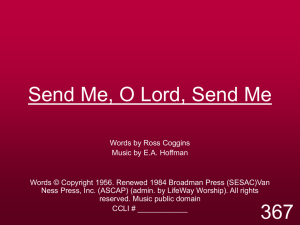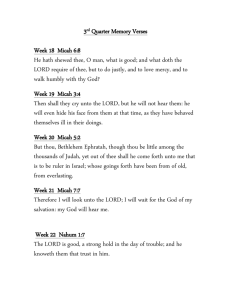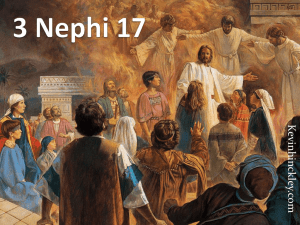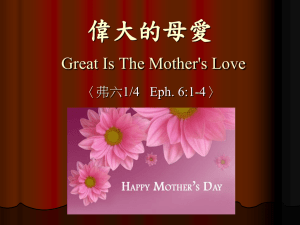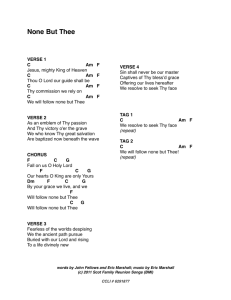3 nephi 21-27 - lefevrefamily.net
advertisement
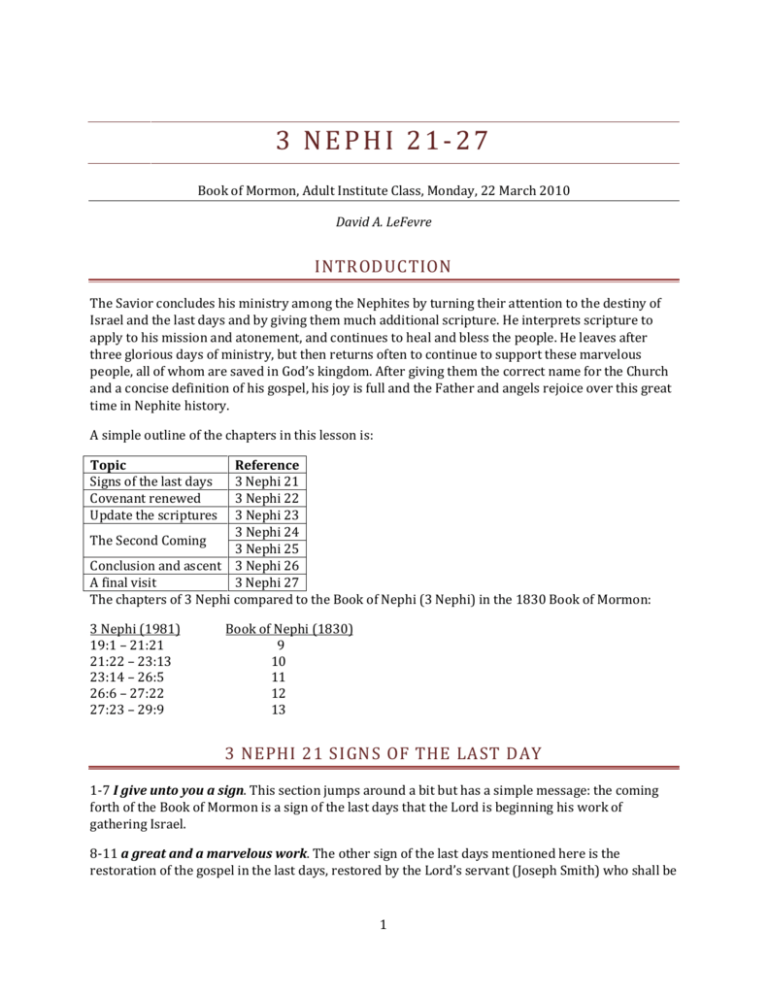
3 NEPHI 21-27 Book of Mormon, Adult Institute Class, Monday, 22 March 2010 David A. LeFevre INTRODUCTION The Savior concludes his ministry among the Nephites by turning their attention to the destiny of Israel and the last days and by giving them much additional scripture. He interprets scripture to apply to his mission and atonement, and continues to heal and bless the people. He leaves after three glorious days of ministry, but then returns often to continue to support these marvelous people, all of whom are saved in God’s kingdom. After giving them the correct name for the Church and a concise definition of his gospel, his joy is full and the Father and angels rejoice over this great time in Nephite history. A simple outline of the chapters in this lesson is: Topic Signs of the last days Covenant renewed Update the scriptures Reference 3 Nephi 21 3 Nephi 22 3 Nephi 23 3 Nephi 24 The Second Coming 3 Nephi 25 Conclusion and ascent 3 Nephi 26 A final visit 3 Nephi 27 The chapters of 3 Nephi compared to the Book of Nephi (3 Nephi) in the 1830 Book of Mormon: 3 Nephi (1981) 19:1 – 21:21 21:22 – 23:13 23:14 – 26:5 26:6 – 27:22 27:23 – 29:9 Book of Nephi (1830) 9 10 11 12 13 3 NEPHI 21 SIGNS OF THE LAST DAY 1-7 I give unto you a sign. This section jumps around a bit but has a simple message: the coming forth of the Book of Mormon is a sign of the last days that the Lord is beginning his work of gathering Israel. 8-11 a great and a marvelous work. The other sign of the last days mentioned here is the restoration of the gospel in the last days, restored by the Lord’s servant (Joseph Smith) who shall be 1 “marred” but healed by the Lord, in order to show that the Lord’s “wisdom is greater than the cunning of the devil.” 12-21 as a lion among the beasts. The Savior quoted Micah 5:8-15, with some interesting differences and additions. Previously, he had quoted Micah 5:8-9 in 3 Nephi 20 (below for comparison), and paraphrased Micah 5:8 in 3 Nephi 16:15. The point of this section is that Gentiles who do not repent and obey the Lord will be cut down, metaphorically like a lion would do to his prey. Their worship of graven images and of fertility goddesses (“groves”) and many other acts of wickedness will come to an end. Furthermore, those of Israel who do not repent will likewise be cut off from the covenant and people of Israel. Micah 5 8 And the remnant of Jacob shall be among the Gentiles in the midst of many people as a lion among the beasts of the forest, as a young lion among the flocks of sheep: who, if he go through, both treadeth down, and teareth in pieces, and none can deliver. 9 Thine hand shall be lifted up upon thine adversaries, and all thine enemies shall be cut off. 10 And it shall come to pass in that day, saith the LORD, that I will cut off thy horses out of the midst of thee, and I will destroy thy chariots: 3 Nephi 20 16 Then shall ye, who are a remnant of the house of Jacob, go forth among them; and ye shall be in the midst of them who shall be many; and ye shall be among them as a lion among the beasts of the forest, and as a young lion among the flocks of sheep, who, if he goeth through both treadeth down and teareth in pieces, and none can deliver. 17 Thy hand shall be lifted up upon thine adversaries, and all thine enemies shall be cut off. 11 And I will cut off the cities of thy land, and throw down all thy strong holds: 12 And I will cut off witchcrafts out of thine hand; and thou shalt have no more soothsayers: 13 Thy graven images also will I cut off, and thy standing images out of the midst of thee; and thou shalt no more worship the work of thine hands. 14 And I will pluck up thy groves out of the midst of thee: 3 Nephi 21 12 And my people who are a remnant of Jacob shall be among the Gentiles, yea, in the midst of them as a lion among the beasts of the forest, as a young lion among the flocks of sheep, who, if he go through both treadeth down and teareth in pieces, and none can deliver. 13 Their hand shall be lifted up upon their adversaries, and all their enemies shall be cut off. 14 Yea, wo be unto the Gentiles except they repent; for it shall come to pass in that day, saith the Father, that I will cut off thy horses out of the midst of thee, and I will destroy thy chariots; 15 And I will cut off the cities of thy land, and throw down all thy strongholds; 16 And I will cut off witchcrafts out of thy land, and thou shalt have no more soothsayers; 17 Thy graven images I will also cut off, and thy standing images out of the midst of thee, and thou shalt no more worship the works of thy hands; 18 And I will pluck up thy groves out of the midst of thee; 2 so will I destroy thy cities. so will I destroy thy cities. 19 And it shall come to pass that all lyings, and deceivings, and envyings, and strifes, and priestcrafts, and whoredoms, shall be done away. 20 For it shall come to pass, saith the Father, that at that day whosoever will not repent and come unto my Beloved Son, them will I cut off from among my people, O house of Israel; 21 And I will execute vengeance and fury upon them, even as upon the heathen, such as they have not heard. 15 And I will execute vengeance in anger and fury upon the heathen, such as they have not heard. 22-29 they shall assist my people. Gentiles who do repent and obey the Lord will have the blessing to help in the latter-day gathering. They become part of the gathering by coming “in unto the covenant” and being “numbering among this the remnant of Jacob.” Then they act as missionaries in taking the good news to “the remnant of Jacob, and also as many of the house of Israel as shall come” and helping to build up the New Jerusalem, the literal and symbolic gathering place of scattered Israel. Note that v. 22 begins an entirely new chapter in the 1830 Book of Mormon, setting it off as a complete change of message and tone. It is, in fact, the turning point from the things that will happen if those of the last days are wicked to the things that will happen if they are righteous. 25 the power of heaven. This has fulfillment when Christ returns the Second time (McConkie 1991, 4:152). But the power of heaven has also come down in this dispensation many times, including 3 April 1836 in the Kirtland temple when several prophets and the Savior himself came down and gave keys, authority, and power to Joseph Smith and Oliver Cowdery (see D&C 110). 3 NEPHI 22 COVENANT RENEWED (ISAIAH 54) As the chapter heading says, this chapter is a quote from Isaiah 54, one of the triumphal chapters of that great prophet. Five of the verses are quoted slightly different in the Book of Mormon (below), while the rest are identical to Isaiah 54 in the KJV. Isaiah 54 2 Enlarge the place of thy tent, and let them stretch forth the curtains of thine habitations: spare not, lengthen thy cords, and strengthen thy stakes; 3 Nephi 22 2 Enlarge the place of thy tent, and let them stretch forth the curtains of thy habitations; spare not, lengthen thy cords and strengthen thy stakes; 3 4 Fear not; for thou shalt not be ashamed: neither be thou confounded; for thou shalt not be put to shame: for thou shalt forget the shame of thy youth, and shalt not remember the reproach of thy widowhood any more. 4 Fear not, for thou shalt not be ashamed; neither be thou confounded, for thou shalt not be put to shame; for thou shalt forget the shame of thy youth, and shalt not remember the reproach of thy youth, and shalt not remember the reproach of thy widowhood any more. 5 For thy maker, thy husband, the Lord of Hosts is his name; and thy Redeemer, the Holy One of Israel—the God of the whole earth shall he be called. 9 For this, the waters of Noah unto me, for as I have sworn that the waters of Noah should no more go over the earth, so have I sworn that I would not be wroth with thee. 15 Behold, they shall surely gather together against thee, not by me; whosoever shall gather together against thee shall fall for thy sake. 5 For thy Maker is thine husband; the LORD of hosts is his name; and thy Redeemer the Holy One of Israel; The God of the whole earth shall he be called. 9 For this is as the waters of Noah unto me: for as I have sworn that the waters of Noah should no more go over the earth; so have I sworn that I would not be wroth with thee, nor rebuke thee. 15 Behold, they shall surely gather together, but not by me: whosoever shall gather together against thee shall fall for thy sake. 1 And then. After the Book of Mormon is brought forth, the gospel restored, and scattered Israel begins to be gathered (chapter 21). 2 strengthen thy stakes. From this verse we get the name “stakes” for our organization of several wards combined. The imagery of enlarging a tent might seem strange in our day when tents are generally self-contained units. But in that day, a tent was made of goat-skin (or some other animal) panels. If you needed to make your tent bigger, you simply added more panels to the edges, put in some more poles to hold it up, and lengthened the cords and moved the stakes on the edge out further to accommodate the larger size. So the Lord’s tent (and “tabernacle” is the word here in Isaiah 54, just like the tabernacle in the wilderness—see Exodus 26) can be enlarged to allow all who join the covenant entrance. 4 and shalt not remember the reproach of thy youth. This phrase is not in the printer’s manuscript, the 1830 edition of the Book of Mormon, or the KJV. It is clearly a typographical error, a duplication from the typesetter looking from one line to the next with similar wording. 5 thy maker, thy husband. God as husband and Israel as bride is a common metaphor in scripture. It reflects a covenant relationship, a relationship of trust and a bond that can be eternal. God is the faithful and forgiving husband, Israel the errant spouse who often goes astray. 7-8 For a small moment have I forsaken thee. Because of Israel’s wickedness, the Lord had forsaken them for a time. But he reminded them that “with great mercies” he would gather them, and “with everlasting kindness” would he extend his mercy. 9 the waters of Noah. Just as the Lord promised that he never again flood the earth (Genesis 9:817), so in the last days he shall extend his kindness to Israel again. 13 all thy children shall be taught of the Lord. The bareness of Israel which was their cursing (v. 1) shall be taken away and replaced with righteous children who are taught personally by the Lord and enjoy great peace. 4 17 the heritage of the servants of the Lord. The great blessing of those who chose to follow God are realized in the last days when they shall enjoy peace and no one shall prosper who comes against them. 3 NEPHI 23 UPDATE THE SCRIPTURES 1 search these things diligently. Having just quoted Isaiah, the Savior commanded the people to search the words of Isaiah diligently, “for great are the words of Isaiah.” See several good quotes on this topic in Student Manual, 331-332. 3 have been and shall be. Many of Isaiah’s words have multiple fulfillments—perhaps once in his own day, once in Christ’s time, and again in the last days. Thus Christ could say that many of his words have been fulfilled but shall yet be fulfilled. 4 write the things which I have told you. Jesus is going to add many things to the Nephite scriptures. His first command is an explicit one to write down what he had been teaching them the last two days, including Micah’s and Isaiah’s words. 7 Bring forth the record. Jesus didn’t ask for all their scriptures, but rather the record that he, Nephi, had personally kept, and those in the line preceding him—the plates of Nephi. 11 ye have not written this thing. I have heard it said that Jesus reprimanded them for not writing Samuel’s teachings, but the account is much more specific. They apparently had all of Samuel’s words recorded but his prophecy that many would arise with Christ and appear to many. This is found in Helaman 14:25. In other words, they left one verse out of the record. Jesus was a careful editor and noticed this small but important item, and asked Nephi to add it. 14 Jesus had expounded all the scriptures in one. This summary of a much longer conversation had to be similar to one the newly resurrected Savior had with two disciples on the road to Emmaus, where he began at Moses (the Law or Torah) and “all the prophets” (Joshua through 2 Kings and Isaiah through Malachi, which is called ‘the prophets’ in the Hebrew Bible) and “expounded unto them in all the scriptures the things concerning himself” (Luke 24:27). 3 NEPHI 24-25 THE SECOND COMING (MALACHI 3-4) 1 write the words which the Father had given unto Malachi. The third thing the Savior had them add to the scriptures were the prophecies of Malachi, a prophet unknown to the Nephites because his prophetic ministry was about 200 years after Lehi left Jerusalem. The quotation in 3 Nephi is nearly identical to the KJV, with only the verses that are different noted below. Note that Jesus attributes Malachi’s words to the Father. Though he was Jehovah and was probably the one to speak to Malachi, he was always acting in behalf of the Father, and so gives the Father credit for it all. This happens a large number of times in 3 Nephi. Malachi 3 5 And I will come near to you to judgment; and I will be a swift witness against the sorcerers, and against the adulterers, and against false 3 Nephi 24 5 And I will come near to you to judgment; and I will be a swift witness against the sorcerers, and against the adulterers, and against false 5 swearers, and against those that oppress the hireling in his wages, the widow, and the fatherless, and that turn aside the stranger from his right, and fear not me, saith the LORD of hosts. 10 Bring ye all the tithes into the storehouse, that there may be meat in mine house, and prove me now herewith, saith the LORD of hosts, if I will not open you the windows of heaven, and pour you out a blessing, that there shall not be room enough to receive it. 11 And I will rebuke the devourer for your sakes, and he shall not destroy the fruits of your ground; neither shall your vine cast her fruit before the time in the field, saith the LORD of hosts. 13 Your words have been stout against me, saith the LORD. Yet ye say, What have we spoken so much against thee? 14 Ye have said, It is vain to serve God: and what profit is it that we have kept his ordinance, and that we have walked mournfully before the LORD of hosts? 16 Then they that feared the LORD spake often one to another: and the LORD hearkened, and heard it, and a book of remembrance was written before him for them that feared the LORD, and that thought upon his name. Malachi 4 2 But unto you that fear my name shall the Sun of righteousness arise with healing in his wings; and ye shall go forth, and grow up as calves of the stall. swearers, and against those that oppress the hireling in his wages, the widow and the fatherless, and that turn aside the stranger, and fear not me, saith the Lord of Hosts. 10 Bring ye all the tithes into the storehouse, that there may be meat in my house; and prove me now herewith, saith the Lord of Hosts, if I will not open you the windows of heaven, and pour you out a blessing that there shall not be room enough to receive it. 11 And I will rebuke the devourer for your sakes, and he shall not destroy the fruits of your ground; neither shall your vine cast her fruit before the time in the fields, saith the Lord of Hosts. 13 Your words have been stout against me, saith the Lord. Yet ye say: What have we spoken against thee? 14 Ye have said: It is vain to serve God, and what doth it profit that we have kept his ordinances and that we have walked mournfully before the Lord of Hosts? 16 Then they that feared the Lord spake often one to another, and the Lord hearkened and heard; and a book of remembrance was written before him for them that feared the Lord, and that thought upon his name. 3 Nephi 25 2 But unto you that fear my name, shall the Son of Righteousness arise with healing in his wings; and ye shall go forth and grow up as calves in the stall. 24:1 my messenger. The Saints in Christ’s time saw this fulfilled with John the Baptist, but the prophesy applies to the Second Coming, so there is also a latter-day fulfillment. This may be a certain person or several (McConkie 1991, 4:162). 24:2 refiner’s fire…fuller’s soap. See Student Manual, 333. 3 Compare D&C 13. 24:5 the widow and the fatherless. See Student Manual, 333. 24:8-12 tithes and offerings. We know nothing of how the Nephites practiced the law of tithing either before or after this teaching by the Savior. But perhaps one of the reasons Jesus quoted this chapter was to give them a more solid scriptural foundation for living this law, which is at least as ancient as Abraham (Genesis 14:20). See (McConkie 1991, 4:164). 6 25:2 the Son of Righteousness. Though the metaphor clearly applies to Christ, this is an error in the Book of Mormon text. Both the printer’s manuscript and the 1830 Book of Mormon have “Son” but it was evidently a simple scribal error—Oliver Cowdery heard Joseph Smith say “sun” and wrote “son.” The correct text is “sun,” referring to an ancient Near Eastern image of a sun with wings, a symbol for many gods, but in this case, for Jesus Christ (Skousen 2005-2008, 2:830-833). This same phrase is found in 2 Nephi 26:9 and Ether 9:22. 25:5 Elijah the prophet. See D&C 110. 3 NEPHI 26 CONCLUSION AND ASCENT 2 These scriptures. As the footnote points out, Christ is referring to 3 Nephi 24-25, quoting Malachi 3-4. 3 from the beginning until the time that he should come in his glory. First Jesus went through the Old Testament citing prophecies about himself (23:14). Now he showed how the scriptures covered his entire mission, from the creation to the great winding up scenes at the end—all the time citing scriptures only from what we would call the Old Testament (and excluding anything except Malachi now that was given after Lehi left, which would have been most of Jeremiah, Daniel, Ezekiel, Ezra, Nehemiah, Haggai, and Zechariah. 6 there cannot be written in this book even a hundredth part. This is a common phrase for the Book of Mormon when describing how much is left out; see Jacob 3:13; Words of Mormon 1:5; Helaman 3:14; 3 Nephi 5:8; and Ether 15:33. 8 brought again unto this people, from the Gentiles. Knowing that his people were rapidly falling into apostasy and self-destruction, Mormon included information about Christ’s visit and teachings that he hoped would benefit his people hundreds of years later. 9 greater things be made manifest. The Book of Mormon is given to “try [our] faith.” If we believe it, accept it, and cherish it, we’ll be given even greater things, including more of the Savior’s messages to the Nephite people. If we do not embrace the Book of Mormon and receive these greater things, it will be to condemnation (v. 10). 11 the Lord forbade it. Mormon wanted to include more but what we have is just what the God told him to include “to try the faith of my people.” 13 three days. The record only gives the details of two days, so the third day is part of what Mormon did not include. He also did not include the contents of his teachings in other visits (“he did show himself unto them oft”) except one—chapters 27-28. 14 the children…greater than he had revealed. Verse 16 explains that this was the day after Jesus’ second departure—so either the third day or the fourth day, if he just stayed all night the second time (because it does say he was with them for three days). The children were so touched by the Spirit that they began to teach their fathers even greater things than Jesus himself had revealed. 17 to baptize and to teach. The twelve were happy to baptize any and all who came to them with a testimony and commitment to Christ. When they did this, the people being baptized were “filled with the Holy Ghost.” 7 19 had all things in common. Like the New Testament Saints (Acts 4:32-35), the Nephites developed a society where they shared for the benefit of all. 21 called the church of Christ. This sets up chapter 27, where the name of the church became the subject of disputation. 3 NEPHI 27 A FINAL VISIT 1 united in mighty prayer and fasting. Even though they were traveling and teaching much, they had the opportunity to get together, just as our modern apostles do each Thursday in the Salt Lake temple (though I’m sure there are times when one or more of them are away on more extended trips). 4 why is it that the people should murmur and dispute. Note that the twelve were not called out. They appear to have been united in their position, but were getting questions (or more) from other church members about their name. 5 Have they not read the scriptures. Teaching from the scriptures first is a great key to successful Church leadership, modeled here by Jesus himself. 8 how be it my church save it be called in my name? During the first few years, the church in our dispensation was first called “The Church of Christ” (D&C 20:1), then “The Church of Jesus Christ,” then “The Church of God,” and even “The Church of the Latter Day Saints.” It wasn’t until 26 April 1838 (D&C 115:4) that the Lord revealed the name by which it is known today—The Church of Jesus Christ of Latter-day Saints (Robinson and Garrett 2005, 4:107-108). 13-21 this is the gospel. The Book of Mormon gives several related definitions of the important message that disciples are to deliver to the world, but this summary—bookmarked by this phrase in verses 13 and 21—is a concise summary by the Redeemer himself, and includes: • • • • • • • • “I came into the world to do the will of my Father” (v. 13). He came to “be lifted up upon the cross” that he might “draw all men unto me” (v. 14). By being thus lifted up, “men [should] be lifted up by the Father” to stand and be judged by Christ (v. 14-15). “Whoso repenteth and is baptized” shall be filled by the Holy Ghost (v. 16). Those who make and keep covenants will be held “guiltless before my Father at that day when I shall stand to judge the world” (v. 16). Those who do not endure are “hewn down and cast into the fire” (v. 17). Those who have “washed their garments in [Jesus’] blood” will enter into God’s kingdom (v. 19). Therefore, repent and be baptized, “that ye may be sanctified by the reception of the Holy Ghost” (v. 20). 21 that which ye have seen me do even that shall ye do. Jesus is our eternal model, the pattern we strive to emulate in all things. 25 out of the books which have been written. Note that v. 26 confirms that “all things are written by the Father,” so any imperfections in earthly records are overcome by his perfect records. 8 27 ye shall be judges of this people. The twelve were given the responsibility to help judge their own people. This ties back to the command to keep good records, because it is using the records that we are judged, so by definition the record keepers become our judges. See Student Manual, 338. even as I am. See Elder John M. Madsen’s comments in Student Manual, 338-339. 30 my joy is great. Jesus must have so enjoyed ministering to the Nephites after all the sorrow he suffered in Jerusalem. So receptive were they and so diligent in righteous choices that “none of them are lost,” giving Christ a fullness of joy, and the Father and all his angels rejoiced. 32 sorroweth me because of the fourth generation. As Nephi (1 Nephi 12:11-12; 2 Nephi 26:9-10) and Alma (Alma 45:12) both declared, the righteousness won’t last forever, but after four generations, wickedness will again prevail. This plays out, of course, in 4 Nephi. 33 the night cometh, wherein no man can work. The Lord is paraphrasing Alma 34:33, where Amulek taught that after this life, “then cometh the night of darkness wherein there can be no labor performed.” WORKS CONSULTED Intellectual Reserve, Inc. Book of Mormon Student Manual, Religion 121-122. Salt Lake City, UT: The Church of Jesus Christ of Latter-day Saints, 2009. Largey, Dennis L., ed. Book of Mormon Reference Companion. Salt Lake City, UT: Deseret Book, 2003. McConkie, Joseph Fielding and Millet, Robert L. Doctrinal Commentary on the Book of Mormon. 4 vols. Salt Lake City, UT: Deseret Book, 1991. Robinson, Stephen E., and H. Dean Garrett. A Commentary on the Doctrine and Covenants. 4 vols. Salt Lake City, UT: Deseret Book, 2005. Skousen, Royal. Analysis of Textual Variants of the Book of Mormon. 4 vols. Provo, UT: Brigham Young University, 2005-2008. 9

